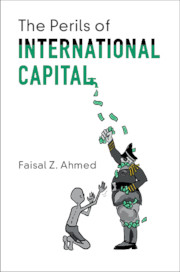‘Faisal Z. Ahmed's study reveals how dictatorships seek foreign capital to sustain their grip on power. previous studies have focused on specific types of capital, such as foreign aid, Ahmed provides a clear, integrated treatment of three major sources: aid, direct investments, and remittances. His conclusion, that these capital flows serve dictatorships in strikingly different ways, is an important contribution to international political economy.'
Charles Lipson - Peter B. Ritzma Professor Emeritus of Political Science, University of Chicago
‘Ahmed provides a marvelous multi-method account of how political institutions mediate the international transfer of funds to governments, people, and firms. His theory emphasizes variation in incentives to governments depending on regime type, and his method engages rich statistical evidence, illustrative cases, and careful attention to endogeneity. The Perils of International Capital specifically focuses on autocracies and documents how capital flows in the form of foreign aid, remittances, and foreign direct investment bolster dictatorships. This is an accomplishment in itself. However, the major achievement of the book is in taking us a major step forward to a deeper and fuller comparative understanding of the effects of contemporary globalization.'
Margaret Levi - Director of the Center for Advanced Study in the Behavioral Sciences, Stanford University, California
'Scholars of globalization have long thought that openness to capital flows would prove destabilizing to the world's authoritarian regime. The Perils of International Capital shows that the opposite is true, providing a unified theoretical account explaining how foreign sources of financing - aid, remittances, and investment - in fact stabilize authoritarian regimes. Applying rigorous statistical tools to a global dataset, and sensitive to the challenges of causal inference, this book is an essential contribution to the international political economy of authoritarianism and democratization.'
Thomas Pepinsky - Cornell University
‘A good book does not close the conversation, but opens it. Faisal Ahmed has written a really good book, opening a conversation about the influence of foreign capital on non-democratic governments.’
Erik Jones
Source: Survival





